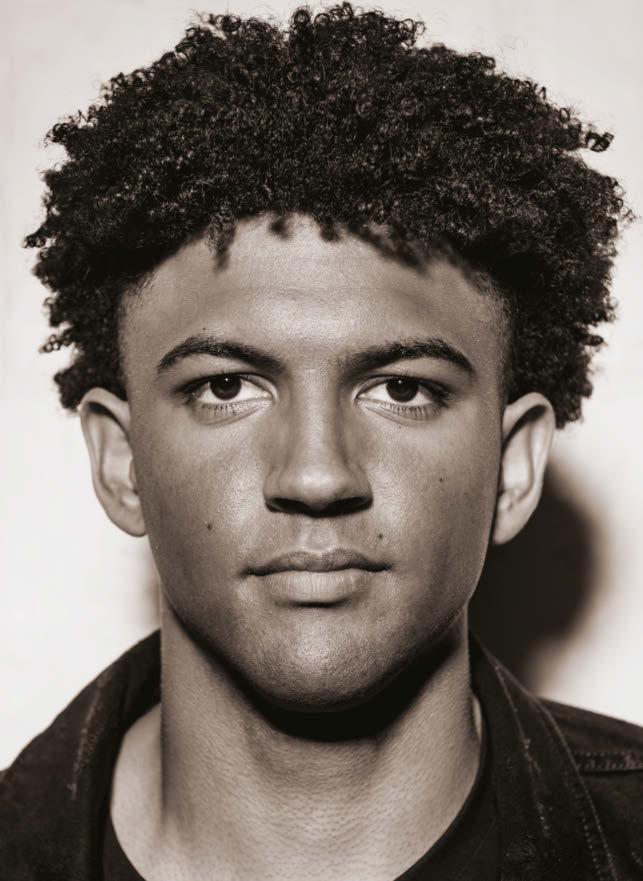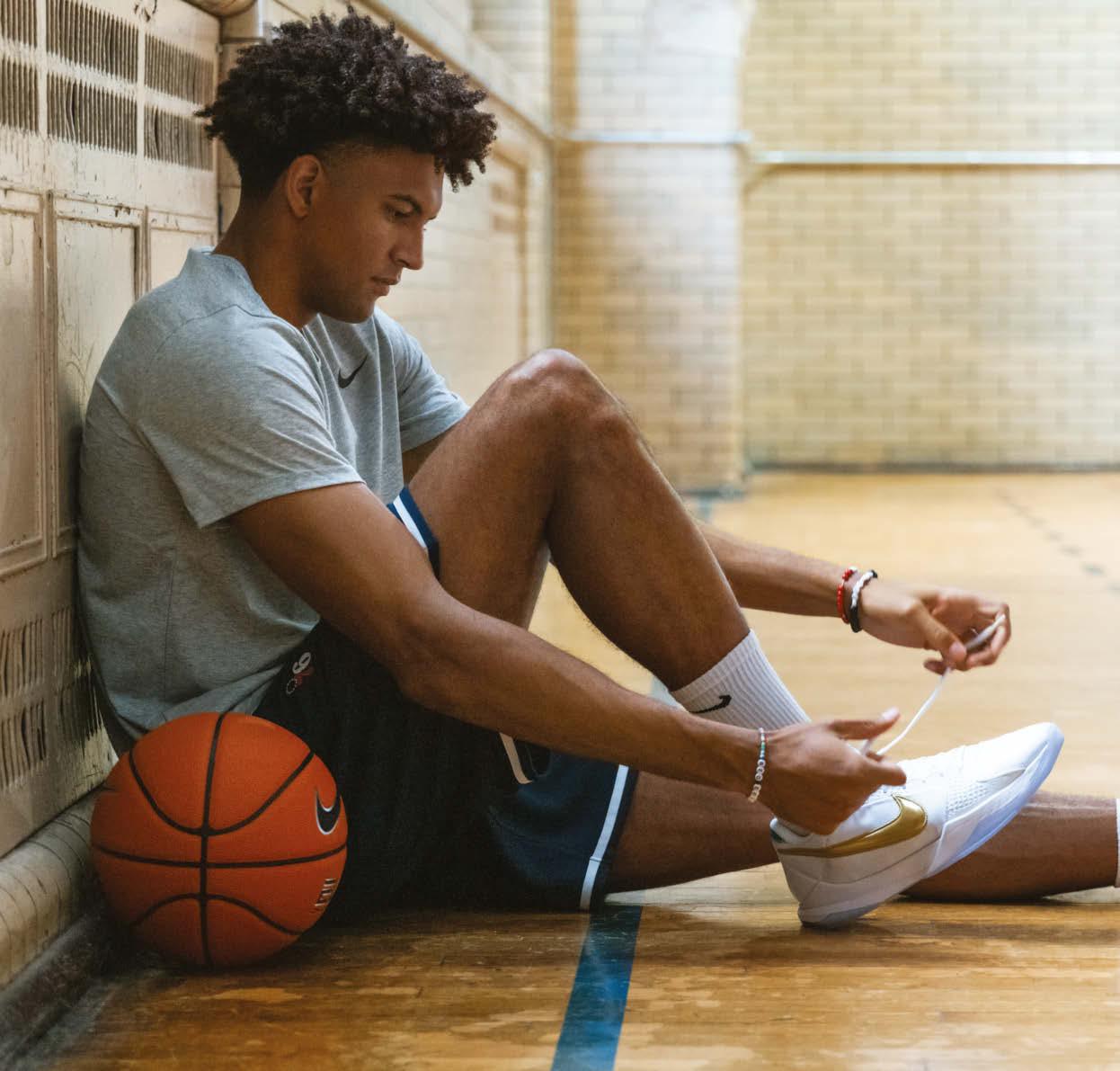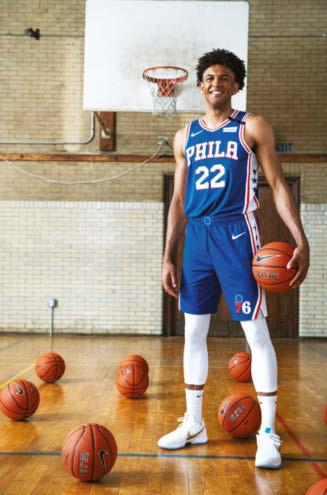
13 minute read
The Disruptor
Matisse Thybulle is an up-and-coming force in the NBA, making his name as a tenacious defensive specialist and unexpectedly impactful content creator.
Words PETER FLAX Photography MICHAEL MULLER
D

efense wins championships. It’s a maxim that has been stated and restated by legends like Michael Jordan and Bear Bryant. When it comes to hoops, rimshaking dunks and 30-foot 3-pointers may get you on SportsCenter, but it’s ultimately hard to win if you can’t stop your opponent. To be truly great at defense—especially at the highest level of sport like the National Basketball Association—one must be selfless, vigilant, relentless, adaptive.
These are things that Matisse Thybulle understands but infrequently discusses. This, perhaps, is part of the code of being a defensive specialist in the NBA—to quietly take care of business without a ton of grandstanding. “Defense isn’t something people focus on,” says Thybulle, 23, who counts Kemba Walker and Kawhi Leonard, both four-time AllStars, as the toughest assignments he’s had so far. “There’s a reason there are not so many people doing it. It’s hard work. It’s not sexy and you’re only noticed when you don’t do your job. But I’ve always embraced it.”
Thybulle, a second-year pro with the Philadelphia 76ers, earned some welldeserved national attention in 2020 for his tenacious D—and for the way he leveraged his voice and his platform and his creative talents. “My rookie season was far from normal,” he laughs. “I’m happy for the success I had on the court and the little success off the court. I experienced a lot in one year.”
Kicking back at home in Philadelphia, Thybulle is reflecting on the past, present and future on a phone call on a midDecember afternoon. The Sixers played their first preseason game—against the Boston Celtics, who knocked Philadelphia out of the playoffs earlier in the year— the night before. Unlike the abbreviated but successful 2019-20 NBA season, which famously took place in a bubble in Orlando, Florida, the 2020-21 season is set to unfold with games in NBA cities. So, in a sense, Thybulle just played his first semi-conventional NBA game in ages—on the hardwood of the Wells Fargo Arena, the Sixers’ home court. “Life is almost normal,” he says. “It’s close. We’re playing basketball like we normally do, but it’s happening so fast. It’s been hard because we are expected to play at a certain level.”
The night before, Thybulle got his minutes against Boston and made all his stops and the Sixers won, 108-99. There’s a new coach—Doc Rivers, who led the Celtics to an NBA championship in 2008—and half his teammates are new. “I like to keep things as simple as possible,” he says. “Last year it was to make a name for myself and establish myself. This year I want to continue to grow my role.”

Thybulle may be a defensive specialist but he’s hardly afraid to take it to the rim if given an open lane.
For a long time, Thybulle did not seem destined to be a professional basketball player. Though he was born in Arizona, he spent most of the first decade of his life in Australia, where he was more interested in swimming than hoops. His family moved back to the States in 2005 and settled in a suburb of Seattle. There, Thybulle says, his love for the game increased. “I liked playing with my friends in middle school, but I really wasn’t that good at it,” he admits. He had size and was as athletic as hell, but he couldn’t consistently make layups until he was in 8th grade. “Basketball was always something I loved but I never thought I was good enough to play at a higher level. I didn’t know that this dream—to play in the NBA— would be a reality until pretty late.”
Things began to change in high school. Because Thybulle had come late to the game and still struggled to score consistently, his father, Greg—a Haitian immigrant who had never played basketball competitively—encouraged him to focus on defense. “I told him: There will always be someone who will shoot the ball better than you,” Greg recalled instructing his son in an interview with ESPN, “but there will never be a better defender than you.”
The approach worked. In just his second varsity game, played late in his freshman year, Thybulle was asked to defend Zach LaVine, an area All-American who would go on to star at UCLA and end up an NBA lottery pick (and now plays for the Chicago Bulls). With college scouts in attendance to see LaVine, the unheralded frosh guarded the superstar like a glove. Thybulle was on the radar.
By the time he graduated from high school he was 6 feet 5 inches tall—with an extraordinary wingspan over 7 feet—

Thybulle, who struggled to make layups in middle school, wound up a first-round pick in the NBA draft.
and had shown more than enough development as a standout defender to be a prized recruit for major college teams. Powerhouse programs like Gonzaga and Cal pursued him but he ultimately chose to stay close to home with the Washington Huskies. Thybulle’s arrival coincided with a new coach and some very strong recruiting, and the Huskies quickly improved from being fodder for better Pac-12 Conference foes to being contenders.
Thybulle’s impact was enormous. Though he evolved to be a consistently decent scorer, he forged a reputation as a defensive specialist. His coach began to call him the Disruptor for the havoc he was creating on the court. Within the Pac-12, he ultimately broke single-season and career steal records that had been set by future NBA Hall of Famers Jason Kidd and Gary Payton, respectively. In his senior year, Thybulle averaged more than 3 steals and 2 blocks per game, something no NCAA player had done for decades.
Ever modest, Thybulle says he didn’t think his NBA dreams would possibly come true until his junior year at UW. “In college I watched a few teammates go pro,” he says. “I didn’t get caught up thinking about it—I focused on getting better. I had to wait my turn and put my head down and continue to work and grow before I could see it as a realistic thing.”
It became a very realistic thing on June 20, 2019. That’s when NBA commissioner Adam Silver called out his name as the 20th pick in the NBA draft. The kid who had trouble knocking down layups in middle school was now a firstround pick and a Philadelphia 76er.
Arookie season is always a bit strange and memorable, but the 2019-2020 NBA season was famously strange and memorable. As with so many other things, a virus thousands of times smaller than a grain of sand altered the narrative of the season. On March 11, 2020—a little more than a month before the regular season was scheduled to end and the playoffs begin—the league suspended play due to the COVID-19 pandemic.
Many professional and elite sports staged pandemic comeback schedules, but very few were as distinctive or successful as the NBA bubble. Starting in early July, the entire league quarantined itself inside Disney World in Orlando for three months of play that would culminate in an NBA Finals series. It was an ongoing international story—many of the most prominent professional athletes on the planet ensconcing themselves at Disney amid a backdrop of COVID-19, social justice upheaval, political instability and a general disruption of life as Americans knew it. The public interest in intimately understanding the NBA bubble was sky high.
Perhaps without fully understanding where it might lead, Matisse Thybulle stepped right into the maw of that massive cultural curiosity. Before he even flew down from Philadelphia to Orlando, he had decided that he would bring along his beloved Canon EOS 5D Mark IV, a gift he had given himself after the NBA draft, and chronicle his experience inside the NBA bubble with a vlog he’d publish on YouTube.
This was not out of the blue for Thybulle. “My friends and I had started doing this sort of thing, with photography and video, in college,” he says. “We would wander around Seattle taking photos or shooting B-roll and then editing it and syncing it to music. So I had a foundation of skills and knowledge.”
Thybulle pauses for a minute and then laughs. “But back then we just shared it with each other,” he notes. “It was different what I shot in the bubble.”
In the first episode of his vlog, Welcome to the Bubble, Thybulle is in his car, a bit frazzled, enduring the rookie ritual of getting all of his teammates takeout from Chick-fil-A before their flight to Orlando. There is something intimate and honest and gently absurd about the whole thing. Then, surrounded by NBA stars, Thybulle chronicles the rest of their journey, capturing the camaraderie and personality of his teammates in the strangest of times.
The vlog was an immediate hit. The nine episodes of Welcome to the Bubble have been streamed a total of roughly 8.5 million times on YouTube. Surely part of the series’ success was how it brought fans into the unvarnished reality of life for NBA players inside the bubble—the realities of their quarantine, the cornhole competitions and golf cart hijinks, the endless joking and bullshitting. And Thybulle himself comes across as this intensely likable figure, too—young and honest and open to the world, ready to play hard and create something artful.

As a rookie, Thybulle averaged 4.7 points and had 94 steals; only 14 NBA players had more steals.
Thybulle says that his father helped shape his views on voting: “Not many people know someone who was directly impacted by a dictator.”

But just as Thybulle intended, the series struck a deeper chord. The NBA bubble occurred as players and American culture at large were grappling with George Floyd and Breonna Taylor and Jacob Blake and the systemic problems that led to their deaths. While athletes in some sports struggled to speak their minds, or faced resistance from their leagues, players in the NBA and WNBA helped lead the conversation about social justice. Welcome to the Bubble captures this effort from the inside. In one scene, as members of the 76ers discuss how they want to effect real change, Thybulle offers a mission statement of sorts: “We got over the hump of ‘oh, we’re in the bubble, what’s life like?’” he narrates behind the camera. “We don’t just want to be a distraction; we want to continue this conversation about whatever needs to be reformed or changed.”
This combination—of entertainment, comedy, honesty, intimacy and social justice documentation—brought the rookie guard a ton of attention. He was feted by Michael Strahan on Good Morning America and interviewed at length by Jimmy Fallon. Throughout it all, he appeared completely focused on his basketball-related responsibilities but also cognizant of larger forces at work and his own creative impulses.
Even now, four months after all that attention, Thybulle is still absorbing the scale of the reaction to his vlog. “There were plenty of out-of-body experiences,” he says. “I mean, I was on Fallon!” But he’s also measured and deliberate about how he brought social justice into the conversation. “It was very intentional. I wanted to be as intentional as possible. When we decided as a league to go back in play, we wanted to do it with the things that were taking place in the country. There was some heavy shit where we wanted to talk about real change. It’s been a cool shift; you saw a lot of it this year—athletes taking control of their platforms.”
For Thybulle, the fight for social justice went far deeper than the conversations shared through his series. In June, wearing a mask and an “I Can’t Breathe!” T-shirt and hoisting a cardboard sign simply declaring “Vote,” the rookie marched peacefully in Philadelphia with his adopted hometown community. The message on that sign resonated deeply all year for Thybulle. When NBA players began wearing jerseys with social justice messages on them, he opted to wear his Sixers 22 jersey with VOTE emblazoned on the back.
When asked why the issue is so personal and important to him, Thybulle says it goes back to his childhood. “Voting is really important to me, and my dad definitely had a massive influence on that and making me think about what it’s like to not have one,” he says, describing how his father came to the States from Haiti long before he was born. “Not many people know someone who was directly impacted by a dictator. So of course I want to help empower Americans to take control of their voice.”
Of course, we are talking in December, after the election for which he had tried so hard to drive the vote. He knows that Philadelphia played a major role in the final outcome. “To be in PA, which was a huge swing state and somewhere that has struggled with the issues we’re dealing with—it’s big,” he says. “I was embraced by this city and I’ve embraced it back. Philly is my home now.”
Now it is 2021, and in some ways, everything is different for Thybulle—he and the rest of the league are no longer playing in a bubble and there is no huge election looming and he doesn’t have a big YouTube series blowing up and he’s finally not a rookie anymore. But in other ways, his priorities remain the same—getting better as a defender and a team player, exploring his creative interests, speaking his voice when it matters.
No thanks to the continued effects of the pandemic, it’s unclear when exactly the Tokyo Games will finally take place— but when they do, Thybulle will be representing Australia on the hardwood. “I have an Olympic dream and I’m glad I have dual citizenship in Australia,” he says. “There’s quite a bunch of Australian guys in the NBA.”
He’s still planning to create and share vlog content, but nothing for now with the cadence or focus of Welcome to the Bubble. “I try to keep in perspective that YouTube and video making is not my job,” Thybulle says. “I’ve just been focused on basketball and family and my health. I want to keep going with the videos, but I’m going to do it in a way where I don’t lose sight of basketball.”
The 2020-2021 season has gotten off to an uneven start—there’s a significantly different squad in Philly and a new coach and a new routine. Coach Doc Rivers has said that the team isn’t quite ready to fully execute his half-court offensive schemes and instead has asked them to focus on defensive effort and transition offense. This plays in well with Thybulle’s defensive-oriented game, which is hard to assess just poring over box scores. In any case, after the first 10 games of the season, the Sixers were 7-3 and sitting atop the NBA’s Eastern Conference.
Thybulle is young enough that he still gets a thrill stepping onto the floor at Wells Fargo Arena, the Boston Garden and other fabled facilities. “It’s pretty amazing,” he says. “I started playing as a kid—watching it and dreaming. It’s amazing that my life has taken on that dream.”


“I like to keep things as simple as possible,” says Thybulle, noting his 2021 goal is to grow his role.

Although he plans to keep making content, Thybulle is focused on “basketball, family and my health.”

Matthews currently has clients on 14 NBA squads and four WNBA teams.






